April 27, 2001
Osaka News
China Beats Germany 3-1
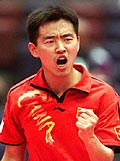 On April 27, China played a quarter-final match
against Germany. China sent in Kong, Wang, and Liu Guozheng. In
the two-and-a-half hour competition, Kong beat Rosskopf, Wang
lost to Boll, Liu beat Franz, and then Kong beat Boll to
eliminate the German team.
On April 27, China played a quarter-final match
against Germany. China sent in Kong, Wang, and Liu Guozheng. In
the two-and-a-half hour competition, Kong beat Rosskopf, Wang
lost to Boll, Liu beat Franz, and then Kong beat Boll to
eliminate the German team.
The first match started as a very close contest. Kong was a
little tight, and Rosskopf showed his fierce attack abilities.
The score see-sawed. At 18-19, Kong changed to his backhands
service. He scored on a direct backhand loop that Rosskopf
blocked off. Then the two players had an exciting long rally, and
after over a dozen looping exchanges Rosskopf netted. The last
point Rosskopf returned Kong's serve off. Kong now had a one game
lead, winning the first 21-19.
After receiving advice from coach Cai, Kong started the next
game 5-0, fully taking advantage of his superior all-round
skills. He had leads of 8-2 and 10-5. Because Rosskopf could play
ferociously, Kong was very conservative with his service returns,
and frequently pushed short. Rosskopf seemed to take advantage of
that to trail only 11-14. At this point Rosskopf had his serves,
and Kong started attacking and also covering his backhand better.
Rosskopf seemed to suffer a collapse and lost 5 points in a row
on his serves. Kong finally ran out the game at 21-11.
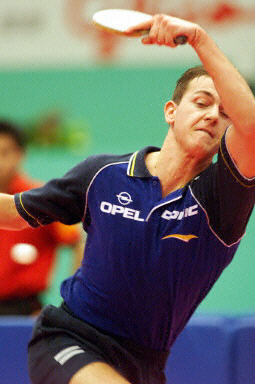 China's second player was Wang Liqin, world-ranked
number 1. His opponent was the youngster Timo Boll. The stronger
Wang did not have any advantage in the first game, and the score
was tight. Boll had a 16-14 lead, then Wang played well to score
4 points in a row to end his service rotation with a 19-16 lead.
Then Wang could not return Boll's serves, lost the next 5 points
and the first game at 19-21.
China's second player was Wang Liqin, world-ranked
number 1. His opponent was the youngster Timo Boll. The stronger
Wang did not have any advantage in the first game, and the score
was tight. Boll had a 16-14 lead, then Wang played well to score
4 points in a row to end his service rotation with a 19-16 lead.
Then Wang could not return Boll's serves, lost the next 5 points
and the first game at 19-21.
In the second game, Boll was playing extremely well from the
start. He led 4-1 after his serves, then 7-3. He made many
amazing shots, and widened the lead to 11-4. Wang was still
struggling, and even served off once. Boll had a 14-6 lead which
increased to 17-8. Now Wang started to show his ability, and
scored 4-1 in the next two service rotations to trail only 16-19.
At 17-19, the two played the best point of the contest, after 6
or 7 away-from-the-table retrieves, Wang transitioned to attacks
and exchanged loops with Boll. After 8 loops and counter-loops,
Wang finally missed long to trail 17-20. But he was not finished
yet, he took advantage of Boll's eagerness to tie the game at
20-all. But then Wang erred on a service attack, and a backhand
serve. So, surprisingly, Boll won the two games to even the match
score at 1-1.
Liu Guozheng played the third match against the veteran Franz.
Liu played very well, and totally controlled hisopponent with his
excellent first-3-shots. He opened a 7-3 lead, and now Franz
settled down to tighten things. After the serve change at 12-8,
Liu scored 4 of the next 5 points on Franz's serves to increase
the lead to 16-9. Now Liu was playing at his peak, smoothly
transitioning from defense to offense, and hitting very
wide-angled cross-court shots to score points. He won easily at
21-11.
In the second game, Liu kept up his aggressive attacks and
quick footwork to open with a 5-0 lead. Franz then increased his
attacks to Liu's middle, and cut the lead to 9-6. But then on his
own service rotation, Franz was scored on heavily by Liu to trail
7-13. Liu widened the lead further to 17-8, and the match was
finished. He finally won 21-13.
In the critical 4th match, Kong faced Boll. Kong started well
and led 5-0 and then 7-3, carefully controlling the tempo. The
19-year-old Boll made it to the final 16 in the last Olympics,
and had the excellent ability to return serves well. Kong changed
to his backhand serves frequently, but Boll closed in to 11-14.
Then Boll used his own serve and attack game to cut the lead
further to trail 14-16. In the next critical service rotation,
Kong backhand served 4 times, but Boll return well to trail by
only one point at 17-18. Now Kong showed his superior mental
quality. He handled Boll's serves well, and took advantage of
Boll's overly eager play to win the game at 21-19.
In the second game, the score was still tight. Kong did not
have any advantage when he served, but he fully exploited his own
all-round strength, neutralizing Boll's attacks with his own
solid defenses. Boll showed his potential at 5-9: after a few
exchanges, Kong had Boll wrong-footed, but then Boll, stumbling,
hit a backhand tennis-style that magically landed on the table,
out of Kong's reach.
Kong, however, was simply better. He increased the pace and
the lead to 19-11. He then played carefully to lead 20-15. He
served a deep serve to Boll's middle that caught Boll off,
finishing the game and the match 21-16.
Kong played very well, and he peaked both physically and
mentally. Liu Guozheng's performance was also outstanding. Wang
as the number-one player in the world, did not play up to his
level. There are things he could learn from Boll on how to return
serves. The European teams have played well in this tournament.
Chung's Notes: There is one problem with having too much
depth: the players are worried that if they do not play their
best, they do not get to play the next match. This puts a lot of
pressure on the younger players like Wang. Now he has to wonder
if he gets to play Korea, or joins Liu Guoliang on the bench. Liu
Guozheng is magnificent as the 3rd player, but will he do as well
in the number-2 position? Kong has been solid so he should be
number 1. Should China play Ma, who has beat Kim in the World
Cup? Wang played poorly against Boll, but was able to stage an
amazing comeback. Would that be reason enough to play him?
China Beats Japan 3-0, Advances Into Finals
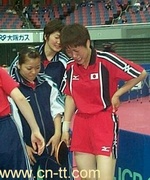 On April 27, China beat Japan in a semifinal match,
and will face North Korea in the finals on April 28.
On April 27, China beat Japan in a semifinal match,
and will face North Korea in the finals on April 28.
The line-ups were a little unusual. Zhang Yining, who has been
playing in the 3rd position up to now, faced Konishi in the first
match. Perhaps Japan figured that the Wang and Li would do well
against choppers and wanted to have Haneyoshi face the younger
Zhang in the 3rd match? In the first game, Zhang was obviously
not mentally in the game, and committed numerous errors to lose
surprisingly at 21-23. She learned from that game, and opened a
5-1 lead in the second. Then Konihsi tied it up. Chinese coach Li
called a timeout and gave some timely advice. Then it was smooth
sailing for Zhang, winning the second 21-15. In the third Zhang
controlled the pace. She was familiar with Konishi's backhand,
and dominated the contest. The game ended 21-10, and China was up
1-0. Judging from this match, Zhang was obviously much better
with the short balls, and had better touch than Konishi.
In the second match Wang Nan played Takada. Right from the
beginning, Takada had a speed disadvantage: she could not keep up
with Wang's quick pace. Also her rallying ability was weaker: she
seldom could stay with Wang for more than 3 exchanges. Quickly
Wang won 21-14. In the second game, Takada still did not have
much of a chance, and could only score points by mixing up her
serves. Wang Nan used her all-round attacks to score another
quick 21-14 win.
In the third match, Li Ju played the chopper Haneyoshi,
originally from China, daughter of a Chinese table-tennis great
and sister of a coach on the Chinese national team. Li played
very smartly, varying the placements continuously, and won the
first 21-15. In the second, Haneyoshi was getting tired, and
could not stop Li's attacks. Li won 21-12, ending the relatively
short contest, and giving China another 3-0 victory.
Even though Japan lost, it has picked up a bronze medal, and
the team has basically met its goal. The team members should be
handsomely rewarded, since the JTTA is known to give generous
cash prizes to players who do well internationally.
In the other semifinal match, North Korea defeated South
Korea 3-1 to earn a chance to dethrone the Chinese. Kim Mo Kyo
scored the only win for South Korea.
Photo Above: Takada in tears after her close win over Badescu
of Romania..
Chung's notes: It is still hard to see how the Chinese can
lose. Zhang is a cool player who, at 19 years old, is getting
better. Wang Nan and Li Ju have great game experiences, and the
Chinese have superb coaching. The thing in N. Korea's favor is
that they do not have anything to lose, while the Chinese may
fall into the trap of not going after their opponents.
Belgium, Sweden and S. Korea in the Men's Semifinals
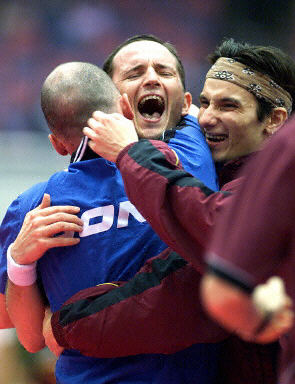
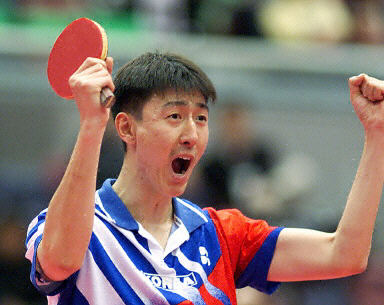 Belgium scored a 3-1 victory over Italy.
Yang Min had the only win for Italy, and J-M Saive had 2 wins. It
was somewhat surprising that P. Saive did not play. Belgium will
now face Sweden in the semifinals.
Belgium scored a 3-1 victory over Italy.
Yang Min had the only win for Italy, and J-M Saive had 2 wins. It
was somewhat surprising that P. Saive did not play. Belgium will
now face Sweden in the semifinals.
Sweden scored a clean 3-0 over Austria, but the matches were
tight. Waldner beat chopper Chen Weixing 2-1. Persson then
defeated Schlager in 2 close games. Hakansson prevailed over Qian
in a 3-game match.
S. Korea eliminated France in a tough 3-2 contest to advance.
In the first match, Oh beat Gatien 21-19 and 23-21. In the second
Legout scored a 2-1 win over Korean ace Kim Taek Soo. The
critical match was the third: Ryu Seung Min beat Eloi 2-0. In the
4th, Gatien beat Kim 2-0 to even the match score at 2-2. In the
deciding 5th, Oh overcame Legout in a tight 2-1 win.
Chung's Notes: S. Korea has to struggle in every match.
Does that make them more ready than the Chinese? Is the injury
Ryu suffered significant? Oh has good records against Kong and
Ma, so should China play Liu Guozheng in the 1st or 2nd spot?
What is happening to Kim, who could not seem to get untracked?
Can J-M Saive win 2 points to give Belgium a chance?
Sharara's Maneuvers?
The Chinese press had a suspicious view on the passing of
the new service rule. This is one of several reports on this
subject.
Very surprising news from yesterday's ITTF meetings: the new
service rule proposal, opposed by many, was passed. This is
thanks to Sharara's exceptional "performance".
There have been discussions on service rule changes for a long
time, and the ITTF even has a committee to study this subject.
The objective is to make the rallies longer. Obviously, the
Chinese feel that this change is aimed at them, because they have
overall better serves, and because the Chinese have a dominance
that is threatening to the sport, in some peoples' minds. The
main reason why this proposal failed to pass in the past is
because it is very difficult to find the objective perspective
for judgment. That's why experts did not expect the proposal to
pass. But ITTF chief Sharara indirectly forced it to pass.
Our understanding is that Sharara personally demonstrated the
new proposal, and praised it exuberantly. According to rules,
after a proposal is presented, the committee members can express
their opinions openly. But for some unknown reason, Sharara let
the European members speak in favor of the proposal, but ignored
the Asian members' request to speak, except the Singaporean
representative who voiced his objections. Sharara just ignored
the Asians who raised their hands to try to speak. In the voting
process, Sharara also was not being straight. A three-quarters
majority was required to pass a proposal, and all the votes
should be counted. The yes votes are green in color, and the no
votes red. But before the vote, Sharara brought up a new rule: if
it looks like there is a overwhelming majority, then it is not
necessary to count the votes. After votes were cast, Sharara
looked at the votes and said: " It is obvious that there are
a lot more green votes than red. If there is no objection, this
proposal is passed". At this time, some members are asking
for a count. But Sharara said that since it was decided earlier
than if the results were obvious, then there was no need to
count, it was not necessary to count now. The irony was that when
the 11-point rule was voted on, Sharara counted the votes very
carefully, even though it was a clear majority win for that
proposal.
In the following news conference, reporters asked Sharara to
explain the new proposals. Sharara only elaborated on the
11-point rule change, but did not discuss the new service rules.
Then he said with great consideration that the rule change is
effective on September 1, 2002, to allow the players time to
adjust.
Chung's notes: The Chinese media overall is suspicious of
the over-selling of the service rule proposal by Sharara. It is
certainly not clear whether that was prompted by the CTTA's
position, or whether some members clearly thought that Sharara
stepped out of line. It would be good to see what the other
associations' positions on this controversial subject. It might
very well be that indeed the proposal passed overwhelmingly, but
to not officially count the votes was to invite controversy.
Back To Index
 On April 27, China played a quarter-final match
against Germany. China sent in Kong, Wang, and Liu Guozheng. In
the two-and-a-half hour competition, Kong beat Rosskopf, Wang
lost to Boll, Liu beat Franz, and then Kong beat Boll to
eliminate the German team.
On April 27, China played a quarter-final match
against Germany. China sent in Kong, Wang, and Liu Guozheng. In
the two-and-a-half hour competition, Kong beat Rosskopf, Wang
lost to Boll, Liu beat Franz, and then Kong beat Boll to
eliminate the German team.  China's second player was Wang Liqin, world-ranked
number 1. His opponent was the youngster Timo Boll. The stronger
Wang did not have any advantage in the first game, and the score
was tight. Boll had a 16-14 lead, then Wang played well to score
4 points in a row to end his service rotation with a 19-16 lead.
Then Wang could not return Boll's serves, lost the next 5 points
and the first game at 19-21.
China's second player was Wang Liqin, world-ranked
number 1. His opponent was the youngster Timo Boll. The stronger
Wang did not have any advantage in the first game, and the score
was tight. Boll had a 16-14 lead, then Wang played well to score
4 points in a row to end his service rotation with a 19-16 lead.
Then Wang could not return Boll's serves, lost the next 5 points
and the first game at 19-21.  On April 27, China beat Japan in a semifinal match,
and will face North Korea in the finals on April 28.
On April 27, China beat Japan in a semifinal match,
and will face North Korea in the finals on April 28. 
 Belgium scored a 3-1 victory over Italy.
Yang Min had the only win for Italy, and J-M Saive had 2 wins. It
was somewhat surprising that P. Saive did not play. Belgium will
now face Sweden in the semifinals.
Belgium scored a 3-1 victory over Italy.
Yang Min had the only win for Italy, and J-M Saive had 2 wins. It
was somewhat surprising that P. Saive did not play. Belgium will
now face Sweden in the semifinals.